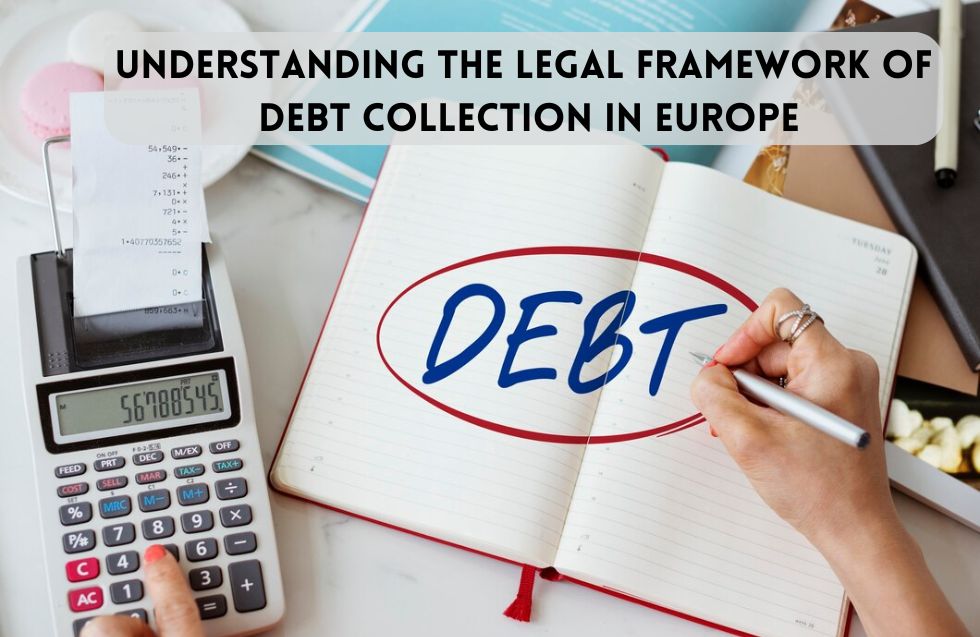Debt collection in Europe operates within a strict legal framework designed to balance the rights of creditors and debtors. This article explores key legal requirements such as the GDPR, outlines the role of compliance in debt recovery, and provides actionable steps to ensure that debt collection agencies adhere to regulations. Understanding and adhering to these frameworks is essential for ethical and effective debt recovery.
The debt collection process is tightly regulated in Europe to protect both creditors and debtors. These regulations ensure that debt recovery practices remain ethical, transparent, and compliant with regional laws. Businesses and agencies that fail to follow these laws risk fines, reputational damage, and loss of client trust. This article provides an in-depth look at the legal framework governing debt collection in Europe, focusing on essential laws, the importance of compliance, and steps to ensure legal adherence.
1. Overview of Relevant Laws
General Data Protection Regulation (GDPR)
The GDPR is a cornerstone of European Union law, emphasizing the protection of personal data. Debt collection agencies must comply with GDPR when handling debtor information.
• Key Provisions:
• Personal data must be collected and processed lawfully, transparently, and for a specific purpose.
• Agencies must secure consent or demonstrate legitimate interest for processing debtor data.
• Data breaches must be reported within 72 hours.
• Implications for Debt Collection:
• Debtor information such as names, contact details, and financial records must be securely stored and only used for recovery purposes.
• Unauthorized sharing or selling of debtor data is strictly prohibited.
Consumer Credit Directive (CCD)
The CCD governs consumer credit agreements in the EU, ensuring fair treatment of debtors.
• Key Provisions:
• Lenders must provide clear and comprehensive information about credit agreements.
• Debtors have the right to withdraw from credit agreements within 14 days.
• Late payment charges must be proportionate and transparent.
• Implications for Debt Collection:
• Agencies must respect debtors’ rights to contest or negotiate repayment terms.
• Clear communication about outstanding debts and penalties is required.
Fair Debt Collection Practices Act (FDCPA) (Applicable to US)
Though primarily a US law, the FDCPA serves as a useful comparison for ethical debt collection practices.
• Key Provisions:
• Prohibits harassment, abusive language, and misleading statements in debt recovery.
• Limits communication to reasonable hours.
• Requires debt collectors to validate the debt upon request.
• Relevance to Europe:
• Similar ethical standards are adopted in European debt collection practices to align with consumer protection laws.
2. The Role of Compliance in Debt Recovery
Compliance is central to successful and ethical debt recovery. Adhering to legal and regulatory frameworks ensures the rights of all parties are respected and minimizes the risk of disputes or penalties.
Key Benefits of Compliance:
• Avoidance of Legal Penalties: Non-compliance with GDPR or local laws can result in fines that significantly impact a business’s bottom line.
• Preservation of Reputation: Ethical and compliant practices build trust with clients and debtors, fostering long-term relationships.
• Efficiency in Recovery: Transparent and legal practices streamline recovery efforts and reduce the likelihood of disputes or delays.
Compliance Challenges:
• Navigating multi-jurisdictional regulations in Europe can be complex due to differing local laws.
• Ensuring that all employees and third-party agents are adequately trained in compliance standards is time-consuming but essential.
3. How to Ensure Your Agency Follows Regulations
1. Conduct Regular Training and Audits
• Training: Educate employees and agents on GDPR requirements, consumer protection laws, and ethical debt recovery practices.
• Audits: Regularly review internal processes and documentation to ensure compliance with legal standards.
2. Leverage Technology for Compliance
• Compliance Software: Use tools that monitor and enforce GDPR and other regulatory requirements.
• Data Encryption: Secure debtor data with encryption tools to prevent unauthorized access or breaches.
• Tracking Systems: Implement systems that log communications and actions for transparency and accountability.
3. Partner with Reputable Agencies
• Due Diligence: Ensure third-party agencies you work with adhere to the same compliance standards.
• Contracts: Include clauses in contracts that mandate compliance with GDPR and local laws.
• Monitoring: Regularly review the practices and performance of partnered agencies.
4. Maintain Transparent Communication
• Clear Notices: Inform debtors of their rights and the purpose of data collection at the outset.
• Validation Requests: Respond promptly to debtor requests for debt validation and documentation.
• Dispute Resolution: Offer accessible channels for debtors to contest charges or negotiate repayment terms.
Conclusion
Understanding and adhering to the legal framework of debt collection in Europe is crucial for ethical and effective debt recovery. Laws like GDPR and the Consumer Credit Directive provide a clear structure for handling debtor data and interactions. By prioritizing compliance through training, technology, and transparent practices, businesses and agencies can mitigate legal risks and enhance their reputation in the industry.












